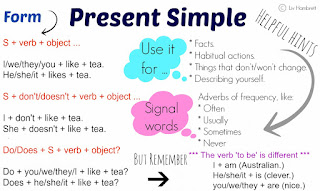
SIMPLE PRESENT TENSE
The simple present tense is one of several forms of present
tense in English. It is used to describe habits, unchanging situations, general
truths, and fixed arrangements. The simple present tense is simple to form.
Just use the base form of the verb: (I take, you take, we take, they take) The
3rd person singular takes an -s at the end. (he takes, she takes)
THE SIMPLE PRESENT TENSE IS USED:
To express habits, general truths, repeated actions or
unchanging situations, emotions and wishes:
I smoke (habit); I work in London (unchanging situation);
London is a large city (general truth)
To give instructions or directions:
You walk for two hundred meters, then you turn left.
To express fixed arrangements, present or future:
Your exam starts at 09.00
To express future time, after some conjunctions: after,
when, before, as soon as, until:
He'll give it to you when you come next Saturday.
EXAMPLES
For habits
He drinks tea at breakfast.
She only eats fish.
They watch television regularly.
For repeated actions or events
We catch the bus every morning.
It rains every afternoon in the hot season.
They drive to Monaco every summer.
For general truths
Water freezes at zero degrees.
The Earth revolves around the Sun.
Her mother is Peruvian.
For instructions or directions
Open the packet and pour the contents into hot water.
You take the No.6 bus to Watney and then the No.10 to
Bedford.
For fixed arrangements
His mother arrives tomorrow.
Our holiday starts on 26th March.
With future constructions
She'll see you before she leaves.
We'll give it to her when she arrives.
FORMING THE SIMPLE PRESENT TENSE: TO THINK
Affirmative
|
Interrogative
|
Negative
|
I think
|
Do I think?
|
I do not think
|
You think
|
Do you think?
|
You do not think
|
He thinks
|
Does he think?
|
He does not think
|
She thinks
|
Does she think?
|
She does not think
|
It thinks
|
Does it think?
|
It does not think
|
We think
|
Do we think?
|
We do not think.
|
They think
|
Do they think?
|
They do not think.
|
NOTES ON THE SIMPLE PRESENT, THIRD PERSON SINGULAR
In the third person singular the verb always ends in -s:
he wants, she needs, he gives, she thinks.
Negative and question forms use DOES (= the third person of
the auxiliary 'DO') + the infinitive of the verb.
He wants ice cream. Does he want strawberry? He does not
want vanilla.
Verbs ending in -y : the third person changes the -y to
-ies:
fly --> flies, cry --> cries
Exception: if there is a vowel before the -y:
play --> plays, pray --> prays
Add -es to verbs ending in:-ss, -x, -sh, -ch:
he passes, she catches, he fixes, it pushes
EXAMPLES
He goes to school every morning.
She understands English.
It mixes the sand and the water.
He tries very hard.
She enjoys playing the piano.
Fill in the blanks with appropriate simple present tense
form of the verb given in the brackets.
1. The plane ………………….. at 6.30. (arrive)
2. I will phone you when he …………………… . back. (come)
3. Unless we ………………………. now we can’t be there on time.
(start)
4. The sun ……………………… in the east. (rise)
5. The next term …………………… on Monday. (begin)
6. She ……………………… an engineer. (be)
7. They …………………. our relatives. (be)
8. When does the train ……………………? (depart)
9. Let’s wait till he …………………….. his work. (finish)
10. Please ring me up as soon as he …………………………. (arrive)
Answers
1. The plane arrives at 6.30.
2. I will phone you when he comes back.
3. Unless we start now we can’t be there on time.
4. The sun rises in the east.
5. The next term begins on Monday.
6. She is an engineer.
7. They are our relatives.
8. When does the train depart?
9. Let’s wait till he finishes his work.
10. Please ring me up as soon as he arrives.







No comments:
Post a Comment